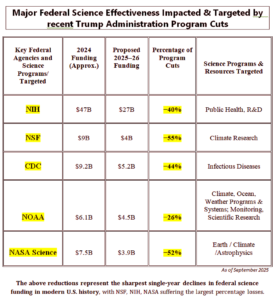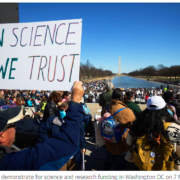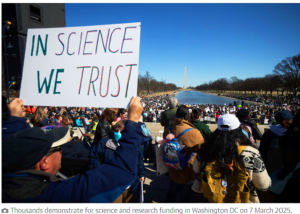Science and Truth the Enemy?
In 2025, the Trump administration has enacted sweeping cuts to major Federally-funded national science programs, freezing awards, eliminating sub-agencies, and reshaping research priorities to de-emphasize climate, health, and diversity topics. During his time in office, including his current term, Donald Trump and his one-man decider administration, has been accused by various legitimate sources of undermining and attacking Science.
Many leading agencies’ budgets are being reduced by 26–55%, jeopardizing thousands of research projects and active research systems, thus jeopardizing global U.S. scientific leadership.
National Science Program Cuts

National Institutes of Health (NIH)
NIH funding reduced by 40%: The budget falls from $47 billion to $27 billion.
Program eliminations: The National Institute on Minority Health and Health Disparities and National Institute of Nursing Research are slated for elimination.
Indirect cost caps: Grantee institutions’ overhead rate is capped at 15%, slashing support for universities and hospitals.
$783 million in health research cuts: Many grants ceased, especially those aligned with diversity, equity, and inclusion (DEI) priorities.
National Science Foundation (NSF)
NSF budget cut by 55%: Falls from $9 billion to $4 billion.
Grant cancellations: Over 1,600 grants canceled, totaling $1.5 billion lost investing; including climate and clean energy programs.
New grant awards frozen: As of April 2025, NSF staff were told to halt all new funding, with a near-total freeze on higher education science grants.
Centers for Disease Control and Prevention (CDC)
CDC cut by 44%: From $9.2 billion to $5.2 billion, resulting in major constraints on infectious disease research, vaccine preparedness, and public health outreach.
National Oceanic and Atmospheric Administration (NOAA)
NOAA cut to $4.5 billion (−26%): Specialized climate and ocean research funding sharply reduced.
Office of Oceanic and Atmospheric Research eliminated: Fundamental climate and weather science programs face termination.
National Aeronautics and Space Administration (NASA)
NASA science directorate funding cut by 52%: Budget slashed from $7.5 billion to $3.9 billion.
Impact: Astrophysics, earth science and climate monitoring, as well as planetary research programs face severe scaling back or elimination. Trump announced last month his plans to terminate two of NASA’s highly successful and accurate Orbiting Carbon Observatory (OCO) satellite missions. The two missions, OCO-2 and OCO-3, provide precise global measurements of carbon dioxide levels and are used for real-time climate monitoring applied to agricultural and ecological forecasting.
Other Agencies and Programs
National Science Foundation STEM grants: 80% drop in new STEM education funding, disproportionately hurting historically underrepresented groups and smaller colleges.
Department of Energy (DOE): Plans to eliminate ARPA–E, clean renewable energy, and climate-focused programs applied to clean energy development.
- Trump’s proposed DOE budget for 2026 seeks to zero out funding for solar, wind, and hydrogen, while slashing energy efficiency and electricity-focused zero emissions initiatives by 70–90%
US Geological Survey (USGS): Program terminations affecting university grants and climate-related research.
Research Areas Most Impacted
Basic Research: Overall support for blue-sky research falls from $45 to $30 billion nationwide (−34%).
Climate, environment, and clean energy: Targeted for near-total elimination or rollbacks.
Public health, minority, gender, and DEI/justice programs: Entire institutes cut or carved out of research budgets.
Consequences and Mission Impact
Grant terminations have disrupted thousands of active research projects, left studies incomplete, and eliminated support for many university labs.
Research jobs lost: Hundreds of research assistant and faculty positions have ended as grants were canceled.
Global leadership: The U.S. is projected to relinquish its top position in science and technology innovation if these cuts are enacted.
Truth & Reality
- Undermining scientific expertise:
- Significant staff cuts at science-focused agencies like the Department of Health and Human Services, Department of Energy, National Oceanic and Atmospheric Administration, and the Environmental Protection Agency.
- Replacing independent scientists on advisory boards with industry representatives or appointees lacking relevant expertise.
- Dismissing scientific advisory committees.
- Restricting the use of scientific information in regulatory documents and policies.
- Hindering research:
- Ordering sweeping and cuts to scientific research funding and programs at agencies such as the National Institutes of Health (NIH), the National Science Foundation (NSF), and NASA, potentially leading to job losses for researchers and delays in critical research.
- Canceling grants related to specific research topics, like diversity, equity, and inclusion, gender ideology, or certain areas of public health research.
- Interfering with research processes, including halting studies, restricting access to data, and destroying records.
- Requiring political appointees to review research programs, potentially leading to the blocking of funding for research that doesn’t align with the administration’s priorities.
- Suppressing and censoring information:
- Removing or altering thousands of federal webpages and databases, many of which contained critical science-based data, especially on environmental and climate issues.
- Ordering federal agencies to eliminate DEI and environmental justice programs and related information.
- Restricting scientists’ communication with the public and media, including requiring permission from political appointees before speaking to reporters.
- Misrepresenting or dismissing scientific findings that don’t support the administration’s agenda, for example by questioning the validity of climate change research.
- Weakening public protections:
- Undermining environmental regulations and policies by weakening chemical safety laws, air pollution rules, and limiting access to information on fracking.
- Eliminating climate change from policy development, including removing mentions of climate change from official documents and websites.
- Ignoring the need for environmental impact reviews and weakening the Endangered Species Act.
An educational foundation for America’s scientific leadership is in jeopardy — and Hawaii will be impacted
STEM education and workforce development cuts have seen the largest drops seen in funding for K–12 and college education programs, especially for underrepresented groups. STEM programs in Hawaii cater to various ages, including after school initiatives like the Hā Initiative for K-8 students and programs such as the Hawaii Science and Technology Museum (HSTM)’s science camps for K-12 students. Higher education offers opportunities like the UH Hilo Keaholoa STEM Scholars Program for underrepresented minority students and the impending STEM Center at Honolulu Community College. For a focus on environmental stewardship, Pilina ʻĀina provides immersive forest field courses in middle-high school.
- It has also been noted that a few areas of select science and technology have been spared by the Trump purge of scientific effort and knowledge, specifically AI and quantum computing which have received prioritization under the Trump administration, but lack a clear plan of presenting a cost-benefit case which justifies Trump’s selective attacks on scientific investments by taxpayers supporting critical areas of benefit to the American public, and the nation.
- Beyond the economic benefits, Science research, discoveries, and applications contribute to informed decision-making and the ability for humanity to solve complex problems (many self-inflicted) that affect society, the future of humanity and life on the planet area a crossroads. In the absence of scientific discoveries, and the truths they reveal, solving many problems of the modern world’s problems which threaten humanity’s survival would remain a mystery, absent of a ways and means for correction and resolution.





Leave a Reply
Join the Community discussion now - your email address will not be published, remains secure and confidential. Mahalo.